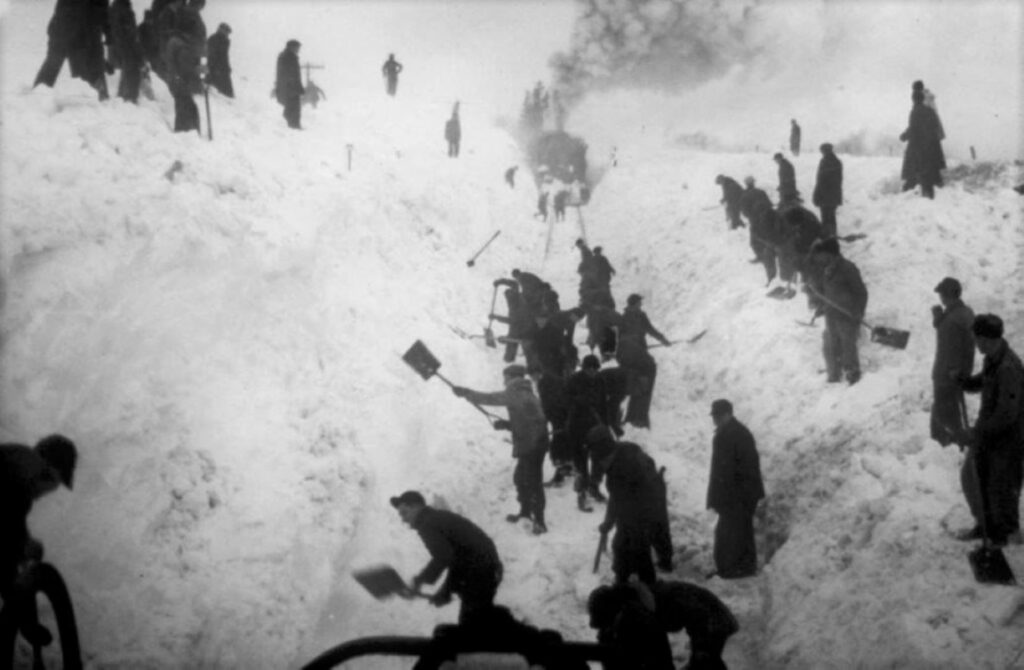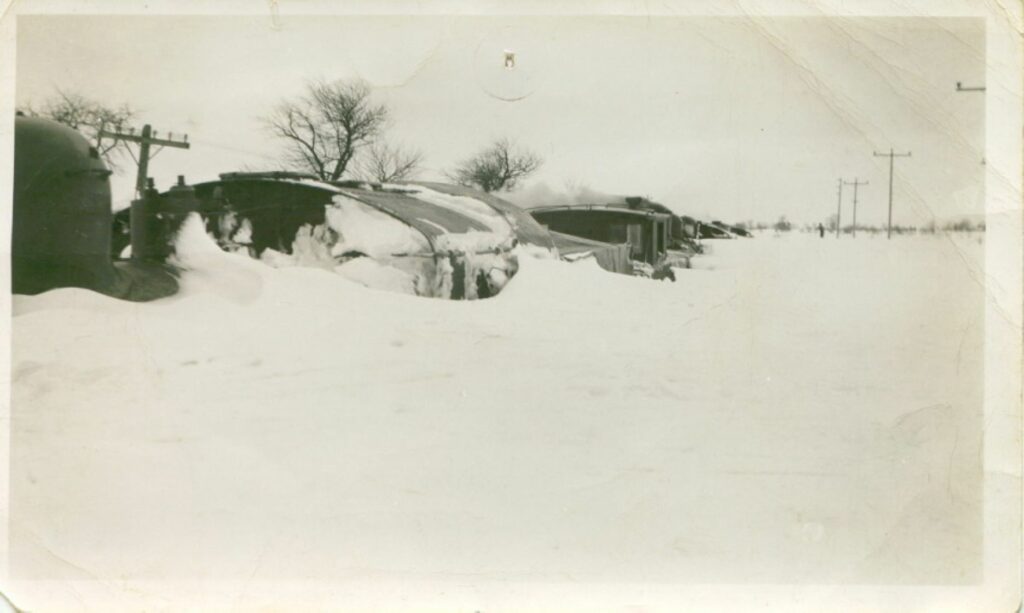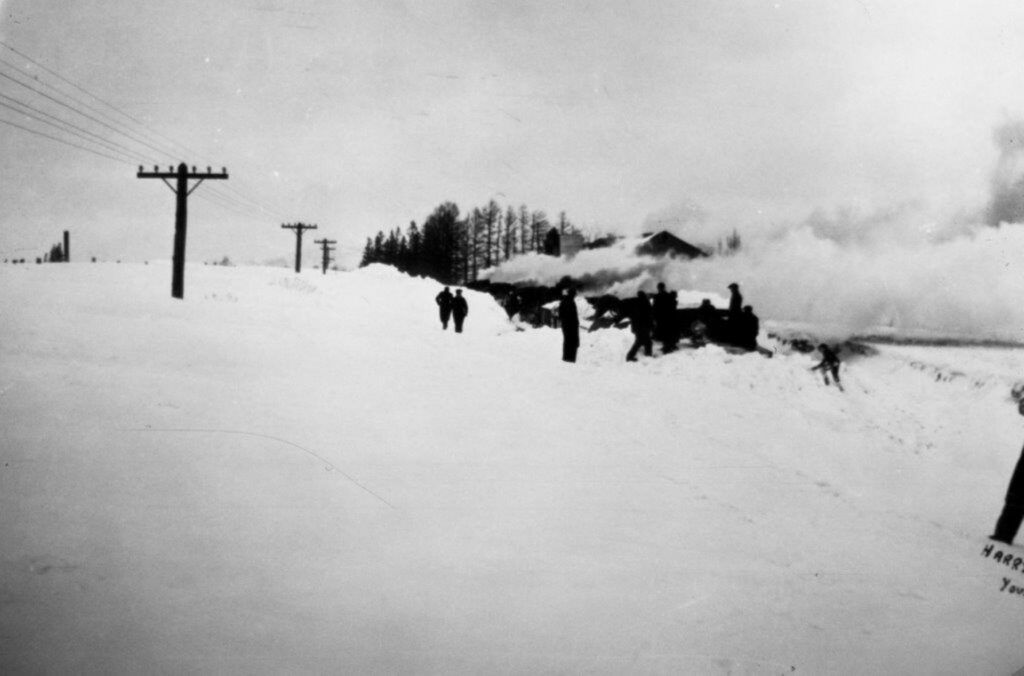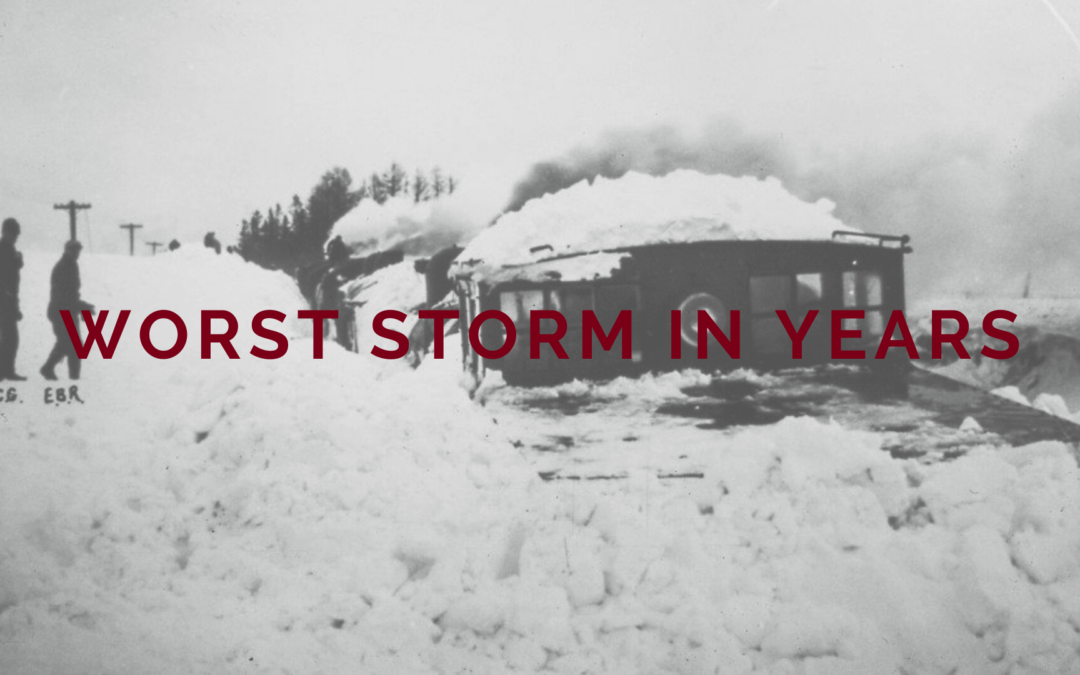March 6, 1947 in the Palmerston Observer
Starting last Sunday night, and lasting until Tuesday night, the worst storm to hit this district in the memory of the oldest inhabitants, was experienced. Monday morning, all motor traffic was stopped, rail traffic hung out a little longer, and finally came to a standstill with hundreds of passengers marooned along the lines, many of them in Palmerston.
Your writer interviewed railroad employees and officials regarding the effects of the storm and location of trains, plows, and other equipment, and answers were, by and large, vague, and indecisive. No one could predict just when lines would be opened, or where the plows and the men with them were marooned. One promising feature was that it was generally expected that the line Palmerston – Toronto would be opened and a train would be through sometime today (Thursday). The time of opening lines to other points was an unknown and unpredictable, as railway men worried about the thaw experienced on Wednesday, when the light and plowable snow, settled into heavy sodden masses that the heaviest of equipment could not buck.
The “Observer” can but record a few of the features of the storm. Tuesday, a plow with 3 engines stuck on a 20-foot hard-packed drift, just west of the town, and every available man was sent out to help free this unit. Another plow was up the Durham branch, no one seemed to know quite where, and it was, from sketchy reports available, completely buried. One report reaching Palmerston by telephone and construed as reliable, told of the engine being completely buried and it was possible to walk right over the locomotive on the drifted snow. Another plow is derailed near Ethel. Hope for the early clearing of the Owen Sound line, were even deeper and askance. There is an engine stuck at Paisley and another engine and plow marooned at Tara.

Wednesday morning there was a sight not seen in Palmerston since the days of the dinky-little woodburners. A plow set out to open the Toronto line, and left Palmerston at 7 o’clock in the morning with four engines pushing behind it. They made Fergus somewhere near 10 o’clock and then bogged down in an exceptionally high drift. With this plow, when every man the railway could scare up, and though no exact number of shovelers was available, it was learned that there were over 50. When this plow bogged down, a fifth engine with a tool car and more shovelers set out after it and they got as far as Drayton, and then the snow that fell in behind the plow train stopped them. While they were stuck, the plow with 4 engines and 50 shovelers managed to dig itself out, and then finally battled its way to Guelph, arriving there about 5 p.m. Ten hours of steady battling to cover less than 40 miles and the snow will have to be winged back before the line can be called “open”. The engine and tool car that followed to rescue “the 4-engine plow” managed to get to Fergus and was expected back late Wednesday afternoon following the train it went to dig out.
Meanwhile, Palmerston is playing host to many storm-bound folks. Mr. Howes, station agent, saw to it that they had such accommodation as they could provide. Well-heated cars were set out for their shelter, and many slept there for 3 nights. Hotel accommodation was taxed to the limit, and Mr. Howes made a radio appeal to householders for use of their spare beds, over station CKNX. This brought good response, and with the C.N.R. footing the bill, many found shelter and comfort in private homes. The supply of home beds passed the demand, and some who volunteered didn’t get their expecting “paying visitors”. Many of the travelers were afraid to journey too far from the Station for fear that a train would leave without them, and they were all understandably anxious to get to their homes.
Last word, even as we were writing this, word came from the railway that a snowblower was being sent in from Capreol, to help in getting the lines open.
Entertainment for the passengers who must while away the hours was a bit of a problem. The pool hall and bowling alley and the restaurants did very well by these folks. The curling club was host to many who enjoyed cribbage games in the clubroom and whiled away the hours at the ancient game of the stones and brooms. Reeve Gallagher and Councilor Bunny Lambert had the plow on the streets to the curling rink plowed early so that our guests might find the walking a bit easier. Ralph Welsh was out with his truckplow trying to keep ahead of the snow, but was delayed when an axle snapped under the strain. Ivan Birk, with his diesel-powered caterpillar tractor plow, was kept busy pushing the snow back along the streets.
Snow removal is costing the Palmerston taxpayer plenty, too, this year. Ruefully, looking at the great piles on the Main Street, Town Clerk S.H. Cunningham made a statement to the effect that over 2 mills of the tax rate had been spent on snow removal and that there would be several hundred dollars more to be paid before this latest accumulation was shoveled off.

A funeral was held Monday afternoon at the height of the blizzard. The caterpillar plow made a trip to the Cemetery several hours before the cortege, and in that lapse of time, the road had blown in enough to make going very difficult. Visibility was almost invisible, and the driver of the hearse could not keep on the road. There was no danger of them going into the ditch, but there was danger of them running too far into one of the banks and becoming stuck. One of the men of the funeral finally walked the centre of the track a few feet ahead of the hearse, and the driver could discern his dark form through the swirling flakes, and followed him like a beacon. Arriving at the highway turnoff, the hearse alone of the cortege made the last lap of the journey to the Cemetery.
With no trains or trucks entering the town, there was a shortage in many lines. Chief among these was the absence of mail, daily papers, and an eminent shortage of bread. Bill Maslin and his staff at Ersman’s Bakery and Bernard Keller and his staff of Keller’s Bakery filled in very nicely here, each bake shop running off extra batches of bread, sacrificing their usual Wednesday half holiday so all might have bread. It was a nice gesture on the part of our local bakers and one which should be appreciated by our local citizens.
Wednesday, with the storm apparently over, many farmers grouped together into squads and came to town. In many cases, their stock was low on feed and their pantry shelves empty. These folks appreciated the action of the bakers and several expressed regret that other stores had not remained open that afternoon.
The plate with chicken hatcheries is very grim. They have hatches come off now, and baby chicks arriving every day by the thousands. With no trains or trucks, they cannot ship them out and it is understood that many thousands will need to be gassed or otherwise destroyed, as the hatcheries are not equipped to handle the quantity hatched and left with them. There is also some loss in day-old chicks enroute to farms and delayed on the road through the storms. Another reflection of the storm is the impossibility of delivering feed to the farms. For some days now, the fleet of trucks operated by E.S. Watt and Sons here have not turned a wheel to deliver their products.
Uncertain delivery of feed is keeping poultry raisers from taking their usual quota of baby chicks and over a wide area, this will probably reflect badly on the egg and poultry market next Summer.
It was said that eight cars were completely buried between Palmerston and Listowel and an unknown quantity between Teviotdale and Palmerston. Leo Lambert of Palmerston had his car stuck on Main Street in front of the G.A. Lawrence residence on Main Street West. That was on Monday, and Tuesday morning, it was completed covered over. Tuesday evening, he and several friends dug the car free and it was pulled from the drift by a wrecker. The 3 automobile tow trucks in town were working almost continually through the 3 days, and in many cases, they were ineffective and old Dobbin had to be called in to drag the cars free of the snow.
Fortunately, for Palmerston citizens the coal merchants went into the storm with good stocks on hand and though deliveries were slow, the coal was got to those who were dangerously low in fuel, deliveries were made by teams, with the coal in bags, humped through hip-deep snow.
Milk delivery was a problem, the Coghlin Brothers using 2 horses and sleighs, found it was impossible to navigate some streets. Both drivers then went on the one sleigh, and most of the milk was carried to the homes. Not all the routes were covered but as one driver explained: “We did all that we could, working until we could take it no longer”, and folks that were not serviced managed to get to the Dairy for supplies until delivery is back to normal.
School children had a field day in the snow particularly after 4 o’clock on Wednesday when the snow was blinding and snowballs could be made and gangs of them could be seen shoving each other off the massive drafts and piles thrown up by the blows, the winds, and service station attendants.
Yes, it was a beautiful storm, and one that should stop all the old-timers dead in their tracks when they start talking about the storm of 19…. “



